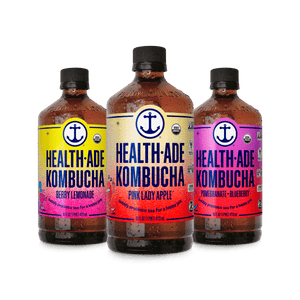
Kombucha | 12 Pack
Fan Favorite Variety Pack
One-time Purchase
49.95

Copied URL to clipboard!
Lately, there has been a lot of buzz about kombucha along with the potential health benefits it provides to drinkers. However, for those kombucha newbies or individuals who are just learning about the beverage, there may be burning questions. After all, why is kombucha considered so healthy? And does the beverage actually live up to the hype?
Firstly, let’s get a couple things clear. Kombucha is a fermented tea—and it’s been around for thousands of years.
Indeed kombucha has been around for thousands of years and has been enjoyed by countless cultures. Kombucha is a fermented tea that is naturally rich in beneficial probiotics and healthy organic acids. Additionally, the drink contains antioxidants, which may help to eliminate harmful bacteria from the body and can also aid in combating aging as well as some diseases.
An age-old kombucha recipe uses four simple ingredients: water, tea (organic green or black), sugar and a SCOBY (symbiotic culture of bacteria and yeast). The SCOBY eats the sugar in the sweet tea which creates bubbles and healthy organic acids. Furthermore, because there is a large amount of good bacteria that is grown during the fermentation process, it is believed that this is where the probiotic benefits are derived. Probiotics are healthy bacteria, and are widely known to improve gut health and enhance the digestive processes.
There a variety of different reasons that kombucha is considered healthy. In addition to being an outstanding source of probiotics, kombucha also contains antioxidants, which carry with them the ability to fight free radicals that can harm the body’s cells. The scientific community is in consensus that it is more beneficial to receive antioxidants from food and beverages as opposed to taking a pill or nutritional supplement. Kombucha is a healthy drink that can help provide your body with probiotics, antioxidants, and other nutrients that can be beneficial for your health
You can drink as much kombucha as it takes to make you feel happy and healthy. There are no rules! Most experts agree that it is perfectly fine for most people to drink kombucha daily; however, if you happen to be pregnant or breastfeeding, or if you have a compromised immune system, it is wise to consult with your doctor first.
If you are interested in learning more about the health benefits of kombucha, as well as what goes into making this delicious fermented tea, we encourage you to reach out to Health-Ade today. Since not all kombucha is created equal, we would love for you to learn about our best-in-class process and what sets us apart from our compatriots! Visit www.health-ade.com today!
VISIT SHOP